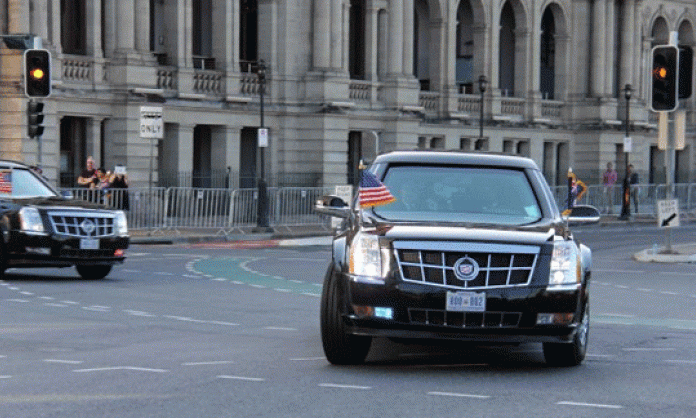It’s Thursday afternoon in Brisbane. There are police stationed in pairs on every street corner. Helicopters circle constantly. A young man is stopped. He’s wearing boots and camouflage pants. Presumably this has marked him out as a “suspicious person”. The police tip the contents of his backpack on to a plastic sheet.
On the next corner, the Four Points Sheraton hotel is enmeshed in security fencing. It is one of the many restricted areas for the Brisbane G20. It looks like a military checkpoint. A row of cops stretches beyond the bars.
At the train station, a few stops out from the city, more police line the platform. They peer into the carriages crammed with workers on their way home. What are they looking for? More “trouble makers”.
By Friday afternoon, media are reporting that police have handed out 15 notices banning people from the city for the duration of the G20 summit. The right to issue these “exclusion” orders is part and parcel of the extreme police powers introduced in the special G20 Security Act.
The police admit that most of the notices they have served have nothing at all to do with protest. They have been given to those who simply do not know that they have to give their details to the police if asked or become subject to arrest. The number of exclusions indicates the heightened police harassment people have been subjected to by the 7,000 cops mobilised by the state.
Saturday evening, the motorcades of G20 leaders are the main cause of chaos. I find myself stuck at a barricade across Adelaide Street with about 300 other disgruntled people. The State Emergency Service workers stationed there are chatty but can’t tell us how long we’ll be stopped because they aren’t told anything themselves – they don’t have the right security clearance.
Behind me a family are late to their son’s year 12 graduation. Across the road their son’s giving a speech and they’re missing it. City worker Nici and seven of her co-workers have been caught in the chaos going home. She tells me that she has been waiting an hour already and that this is the second time she has been paralysed by a motorcade today.
Half an hour later Obama’s motorcade drives by and we are allowed to cross. Tens dash towards the car park under King George Square. The Brisbane City Council has offered free parking there this weekend to attract people to the city. It was worried about the effect of images of militarised and empty streets on the city’s tourism trade.
In a hot basement, we find ourselves trapped again. I go for a walk along the row of banked up cars and run into Nici once more. She is enraged. “I was stuck for an hour before work this morning and for two hours after. It’s so frustrating because people have come to the city for free parking and now they’re stuck.
“We are missing our work Christmas party, and I lost an hour’s wage this morning because I couldn’t get across the street. I’ve spent three and a half hours waiting today”, she complains. Her workmate leans across to add, “Obama went past at 5:30, then, an hour later, drove back in the opposite direction. Literally, we were stopped so he could change for dinner!”
Ironically, in the lead-up to the G20, the police and media spoke only of the disruption to be caused in Brisbane by “violent” protests. But the G20 people’s rally on Saturday afternoon was an entirely peaceful affair. A thousand people gathered in the sweltering heat to hear speeches in Roma Street Forum by unionists, Aboriginal rights activists and environmentalists. We then marched to Musgrave Park, site of the Brisbane Aboriginal Sovereign Embassy.
No one flouted the prohibited items list – save for a few larger than permitted banners. It was a lively and loud march despite the ban on megaphones imposed by the police. There was an array of colourful placards, highlighting opposition to the world leaders’ agenda of economic austerity, environmental inaction, racism and war.
The only disruption in Brisbane is bored cops and the grooming routines of the global elite.








